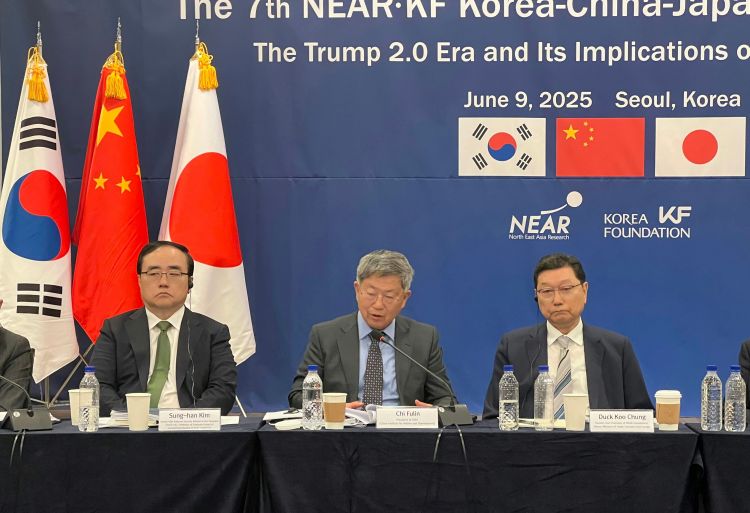Professor Chi Fulin, President of CIRD, Participates in Thematic Discussion at 2025 NEAR Korea-China-Japan Seoul Process
On the afternoon of June 9, 2025, Professor Chi Fulin, President of China Institute for Reform and Development (CIRD), was invited to attend the thematic session of 2025 NEAR Korea-China-Japan Seoul Process—The Trump 2.0 Era and Its Implications on Northeast Asia, co-hosted by NEAR (North East Asia Research) Foundation and Korea Foundation (KF). Professor Chi joined Session 3: “What impact would Trump’s tariff war have on the three countries’ economies in Northeast Asia?” as a discussant.

Professor Chi emphasized several key points during the discussion: First, the U.S.-initiated tariff war is essentially a manifestation of the “America First” strategy in the context of shifting global geoeconomic dynamics. As U.S.-led globalization becomes a thing of the past, regional economic integration is emerging as a prevailing trend. China, Japan, and Korea should take the lead in advancing the process of regional free trade. Second, the three countries face common challenges under the tariff war. The United States holds significant trade deficits with all three countries, while Japan and Korea remain heavily dependent on the U.S. market. The tariff war will inevitably have a substantial impact on the economies of all three countries. Third, under the pressures of the tariff war, economic and trade cooperation among China, Japan, and Korea will “fall behind if not move forward”. In recent years, both the value and dependency of intra-regional trade have declined, with Japan’s trade with China and Korea showing the most significant downturn, becoming a pronounced weak link in regional cooperation. Fourth, accelerating the China–Japan–Korea Free Trade Agreement (CJK FTA) process is the most important and urgent task for trilateral cooperation. It is crucial to push for a breakthrough in the CJK FTA negotiations within this year and use the CJK “minilateralism” to drive progress in the RCEP “multilateralism”. Fifth, China’s recent efforts in expanding market access in the services sector, promoting voluntary and unilateral opening-up, will play an important role in deepening trilateral cooperation and jointly responding to the challenges posed by U.S. tariffs.
The session was moderated by Wang Xingyu, Professor of the Director of the Department of Diplomacy at the School of International Studies at Renmin University of China. Other panelists included Ma Xiaoye, President of the Shanghai Academy of World Watch; Arata Kuno, Professor of International Economics at the Faculty of International Relations at Asia University; Mansoo Jee, Senior Research Fellow of Korea Institute of Finance; Kazuto Suzuki, Professor of Science and Technology Policy at the Graduate School of Public Policy at the University of Tokyo; Taeho Bark, Professor Emeritus of Seoul National University and Former Minister of Trade. The session featured in-depth discussion on topics such as “How seriously will the Trump administration's tariff war against all other countries affect the global supply chains and production networks?”, “What is your evaluation over China's recent tariff deals with the US. What lessons can Korea and Japan learn from this?”, and “Amid the current and future instability and turmoil of the global trade order, how can Korea, China, and Japan advance their efforts to nail down the trilateral Free Trade Agreement?”.


 官方微信扫一扫
官方微信扫一扫 官方微信扫一扫
官方微信扫一扫